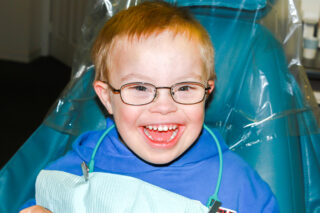
More Dental Health Articles
Special Needs Dentistry For Kids With Down Syndrome

October is designated as National Down Syndrome Awareness Month
Finding a dentist skilled in working with children with special needs is not always easy. A pediatric dentist must acquire additional education and training in the various needs and methods of treatment for this population.
Smile Wonders is uniquely qualified to offer compassionate care to children with special needs like Down Syndrome, Autism Spectrum Disorders, Cerebral Palsy and other congenital conditions. Dr. Rishita Jaju’s experience includes time as a Children’s Hospital LEND Fellow (Leadership Education in Neurodevelopmental Disabilities), where she worked closely with children with medical or behavioral special needs, as well as ongoing education.
Oral Development Differences
In order to provide the best dental health care we must first understand the developmental differences in children with Down syndrome.
For children with Down syndrome, both their baby teeth and permanent teeth make take longer to come in. They may get their first teeth at between 12 and 14 months—or as late as 24 months, as compared to 6 to 12 months for children without Down syndrome. A full set of 20 baby teeth may not appear until the child is four or five years old, and the front permanent teeth and six year molars may not erupt until ages eight or nine. The teeth may also come in in a different pattern than in children without Down syndrome.
The teeth of children with Down syndrome may be smaller than average, with shorter roots, and several teeth could be missing altogether. These conditions can create spacing between the teeth. If their jaw is also smaller, the teeth may be crowded, resulting in “impacted” permanent teeth. They may also have large tongues, or a tongue that is too large for a smaller upper jaw.
Because a person with Down syndrome has been shown to have an increased risk for gum (periodontal) disease due to an impaired immune syndrome that precludes natural protections, it is important to provide proper daily oral health care, which we’ll be glad to demonstrate to the parents. Teeth should be brushed twice a day—especially along the gumline (morning and evening)—with a soft toothbrush or an automatic toothbrush, and flossed daily. Watch for bleeding gums; this could indicate inflammation or infection.
A Visit to the Pediatric Dentist
Dentistry for those with Down syndrome also means understanding the emotional and physical responses created by a visit to the dentist. Giving the patients extra time to relax, feel comfortable, and trust the dental professionals are key elements to successful treatment. Familiarization with the people, equipment and methods of dental care are also important for trust.
We try to schedule patients early in the day, before they become over-tired, or find a time that works best within their routine, and offer a friendly and welcoming environment with reduced distractions. Sounds, sights and other stimuli are minimized during the visit within a designated Quiet Room. Visits can also be split to make them short and quick, or longer to accommodate those who take longer to relax. Compliments and rewards are often employed to encourage cooperation.
Special Needs Dentistry for Children with Down Syndrome at Smile Wonders in Reston, VA
Schedule your appointment by contacting Smile Wonders at 571-350-3663 or visiting our Special Needs Dentistry page. Our first-floor offices are conveniently located in Reston, Virginia to serve families throughout the Northern Virginia/DC Metro region.
Other Articles You May Find of Interest...
- Let’s Smile Dental’s 7&Up Club
- Strengthening Smiles: Understanding the Importance of Splinting Periodontally Involved Teeth
- Understanding Soft Tissue Grafting: A Key To Periodontal Health
- New Solutions for Dentures and Dental Implants
- Cerec Dental Technology
- Commonly Treated Orthodontic Problems
- Can You Benefit From Braces?

















